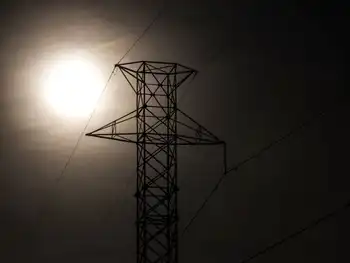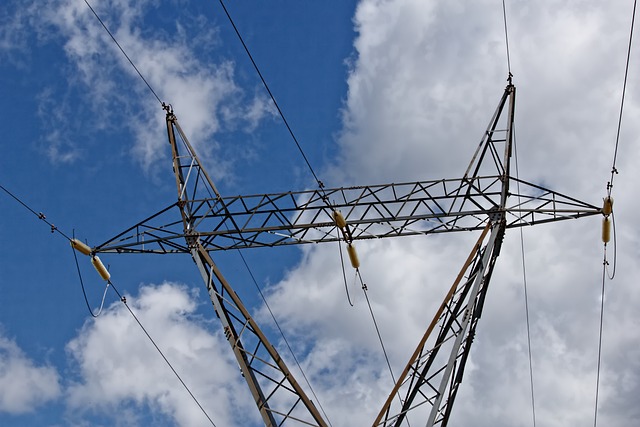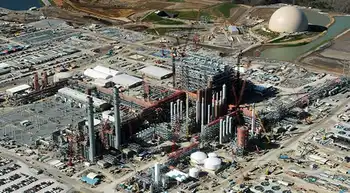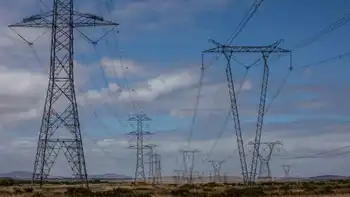Questions remain a year after power deal
FREDERICTON, NEW BRUNSWICK - It has been one year since the premiers of New Brunswick and Quebec held a news conference in Fredericton to announce the now ill-fated, $4.8-billion plan to sell New Brunswick's power utility to Hydro-Quebec. But while a lot has changed since then, New Brunswick's energy woes remain.
The deal proposed by Quebec's Jean Charest and then-premier Shawn Graham of New Brunswick would have eliminated NB Power's debt, and frozen power rates for residential customers for five years.
However, the announcement drew an immediate backlash from New Brunswickers — concerned they were losing control of the Crown-owned utility to another province — and from Premier Danny Williams of Newfoundland and Labrador, who warned about signing any deals with Quebec.
The deal was eventually watered down to a $3.2-billion package in which New Brunswick retained control over transmission and distribution. That deal fell apart and the public outcry over Graham's plan is seen as a major reason for the defeat of his Liberal government last month.
Now the new Conservative government of Premier David Alward is faced with a debt-laden utility, struggling industries who crave a break on their power rates, and a crippled nuclear power plant undergoing a refurbishment that's running three years behind schedule and at least $1 billion over budget.
The Alward government was elected on a promise to freeze power rates for three years, but so far they have yet to explain how that can be done without burying the utility deeper in debt.
"The answers are out there," Energy Minister Craig Leonard said in an interview. "It's a matter of pulling them all together in a comprehensive, long-term policy for the province."
The new government has enlisted a former Tory member of the legislature and a former deputy minister of energy to form a commission that will produce an energy strategy for the next decade.
"What we want to do is listen to the energy commission, lay out a long-term energy policy for the province so that we know where we want to go," Leonard said. "Then we can look at the projects and different processes that we want to put in place with NB Power, with new generation, with transmission and with regional collaboration."
Leonard said he believes regional collaboration with the New England states and neighbouring provinces, including Quebec, will benefit every jurisdiction in generating and delivering power at competitive prices.
Newfoundland and Labrador is looking at a plan for an underwater cable to get power from the Lower Churchill to Nova Scotia so that electricity could then be routed through New Brunswick to New England. Leonard said he hasn't had any official discussions with Newfoundland yet.
Despite the lack of new projects and estimates that the nuclear reactor at Point Lepreau won't return to service until the fall of 2012, Leonard said the government will keep its pledge to freeze power rates.
Norm Rubin, senior policy analyst with Toronto-based energy watchdog group Energy Probe, says that's a foolhardy idea.
"Electricity is too important to be treated like a political football," Rubin said.
"One of the first things that you have to do to get real in planning an electricity system and running it, is to pass on the real commercial style costs of manufacturing electricity to your consumers."
He said while you can freeze the price, you can't freeze the cost of producing electricity, especially when you are buying fossil fuels.
"You never end up paying the real price for electricity, and then you have to build too much generating capacity because people are using too much electricity because the price is artificially low," Rubin said. "At some point it's unsustainable."
Meanwhile, the Opposition Liberals say the new government must get tough with the federal government on the cost overruns at Point Lepreau.
"It's not a time to play nice," said Liberal Donald Arseneault. "We've been dialoging with the federal government for over a year now on this issue alone and the federal government has a role to play."
The former Liberal government threatened legal action if the federal government didn't pay the costs.
The refurbishment is being done by Atomic Energy of Canada Ltd., a federal Crown corporation.
It is the first time a Candu-6 reactor has been given a complete overhaul, and the former government said New Brunswickers shouldn't have to pay the price while AECL learns to get up the learning curve on the work.
Alward said he repeated that argument when he met with Prime Minister Stephen Harper last week, adding that legal action would be a last resort.
"If the federal government and AECL are not prepared to move further, then most certainly I will do everything I have to do to ensure that the interests of New Brunswickers are protected," Alward said. "Right now I believe we can accomplish more by being at the table."
No further meetings with the prime minister or AECL have been scheduled.
"The number one concern that I have right now is that we get the refurbishment finished in a timely fashion without further delays and completed safely," Alward said.
Related News

Ontario takes constitutional challenge of its global adjustment electricity fee to Supreme Court
TORONTO - The Ontario government wants the Supreme Court of Canada to weigh in on a constitutional challenge being brought against a large provincial electricity charge, a case the province claims raises issues of national importance.
Ontario’s attorney general and its Independent Electricity System Operator applied for permission to appeal to the Supreme Court in January, according to the court’s website.
The province is trying to appeal a Court of Appeal for Ontario decision from November that said a legal challenge by Hamilton, Ont.-based National Steel Car Ltd. should be sent back to a lower-court for a full hearing.
Court reinstates constitutional challenge…




